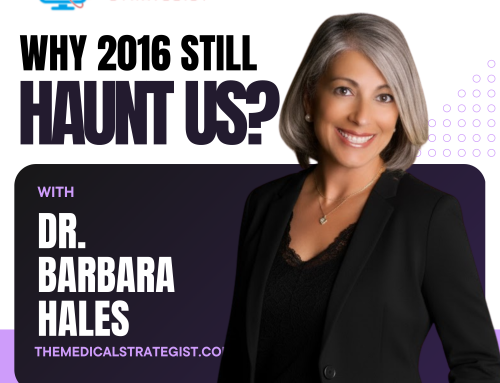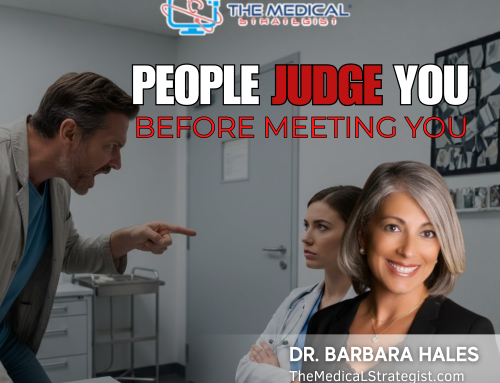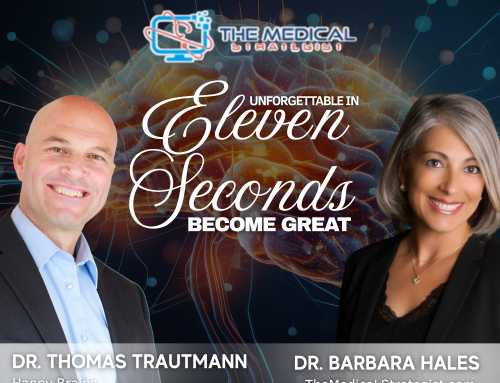Podcast: Play in new window | Download
Subscribe: RSS
In this episode, Dr. Hales and Allen Freeman discuss:
- Financial planning for physicians
- Tax Strategies for high earners
- Retirement income and wealth preservation
Key Takeaways:
“Have a good, strong tax strategy plan, regardless of your career level as a physician. Because it’s not about how much you make—it’s about how much you keep.” – Allen Freeman.
Connect with Allen Freeman:
Website: https://www.golifepathadvisors.com/
LinkedIn: https://www.linkedin.com/in/allenfreemancfp/
Facebook: https://www.facebook.com/allen.freeman1/
Instagram: https://www.instagram.com/allenfreemanjr/p/DFIdJTkJy_H/
Connect with Barbara Hales:
Twitter: @DrBarbaraHales
Facebook: facebook.com/theMedicalStrategist
Business website: www.TheMedicalStrategist.com
Show website: www.MarketingTipsForDoctors.com
Email: info@TheMedicalStrategist.com
YouTube: TheMedicalStrategist
LinkedIn: www.linkedin.com/in/barbarahales
Books:
Content Copy Made Easy
14 Tactics to Triple Sales
Power to the Patient: The Medical Strategist
TRANSCRIPTION (201)
Dr. Barbara Hales: Welcome to another episode of Marketing Tips for Doctors. I’m your host, Dr. Barbara Hales, and today we have with us Allen Freeman. He is a certified financial planner and Founder and Managing Partner of LifePath Advisors, a firm built to help physicians and high-income professionals align their wealth with what matters most, family, vision and a purpose driven life.
Allen comes from a medical family. His father was a plastic surgeon, his mother a nurse, and his brother a family physician that background gives him a rare real world understanding of the financial pressures, time constraints and career demands that doctors face. It’s this personal insight that allows Allen to connect deeply with the physicians he serves and why so many choose life path over large, impersonal firms.
Allen leads LifePath Advisors with values, first, client centered approach. His firm acts as a personal CFO for physicians, offering truly comprehensive planning that covers everything from tax strategy and investment design to retirement optimization, legacy planning, risk management and more. Welcome to the show, Allen!
Allen Freeman: Good, thank you, Barbara! I appreciate being here.
Choosing Business Over Family Medicine
Dr. Barbara Hales: Okay, so your mom, your dad and your brother are in medicine. Why did you not follow suit?
Allen Freeman: I get asked that question a lot. People kind of find early in their life of how they want to help people, and they chose medicine as that avenue to express themselves and helping people. For me, it was always about business, how things worked in the in the business setting, and that kind of led me. I started in commercial real estate in Atlanta and then got led into doing financial planning.
Dr. Barbara Hales: And how did you come to decide that money is where you wanted to help people instead of, you know, any facet of, you know, being a health professional?
Allen Freeman: Well, it’s two different paths early on, either so liberal arts, or like my daughter’s in law school now. So it was very much of a liberal arts or reading or writing, and then it was more of, not necessarily the math and the science, but more of how business I was. I was attracted to business books more than I was novels or the kind of reading that I think physicians go down or attorneys go down, as far as just an interest level,
Dr. Barbara Hales: Okay, so you said, you know, medicine is okay, but I’m interested in making money.
Allen Freeman: Well, making money and also helping people, because I also saw the pitfalls, you know, with a lot of my doctors, my dad’s friends that were doctors. And you learn a lot sitting around the dining room table, and some of the mistakes that that he made, that we all had consequences of like buying an apartment building and not realizing that the tenant quality isn’t good, and all of a sudden, you’re having to feed the note until you can sell the property and that hurts lifestyle for the whole family for a while.
So those kinds of bad investments that I’ve seen him do from bad advice, that I would look at it differently and say, gosh, you know, maybe we wouldn’t have done that deal at all. Or, you know, what is the structure of the tenant base that we know you’ve got guaranteed cash flows. So that was that dinner table talk kind of led me in the direction of business.
Financial Habits for Young Doctors
Dr. Barbara Hales: What should early career doctors focus on financially?
Allen Freeman: Well, start early in building good habits and start with building with intention. My daughter’s just finished her second year of law school, and her husband, they just got married, is finishing dental school, so but it’s starting in habits, because once you get out and you start making some money, and you’ve got some prestige, you’ve got some accomplishment, you tend to kind of lose track of what’s important and building a foundation for yourself and for your family.
So it’s starting with that intention. You know, start saving early, start paying attention to taxes early, because taxes will be the largest expense for high-income earners like physicians and start setting dollars aside, getting a good advisor so that you’re doing the right things early on and not playing catch up mid-career.
Mid-Career Doctors’ Financial Pitfalls
Dr. Barbara Hales: What are mid-career doctors most often doing wrong financially?
Allen Freeman: Well, a lot of it is they get caught up in, I guess, what I call lifestyle creep. They’re made they’re making more money, and that’s a double edged sword. Things can get dangerous because they are making a lot of money. They’re extended a lot of credit. They can go out and get things on future income, but their plan typically hasn’t evolved. They’ve been practicing for 10 or 15 years, but they’re but all of their accounts are scattered, all of their accounts and even their insurance is outdated, because they get started early on, they need some insurance, they need some disability, and they take this they tend to stay with that particular person or firm, and just set it and forget it, and start continuing to grow their practice and build. And they get outdated very, very quickly, with their investments scattered all over the place, and they’re in silos with different people not coordinating their entire financial lifestyle that they’re building.
Retirement Tax Strategy for Physicians
Dr. Barbara Hales: What should late career positions be doing differently as they approach retirement?
Allen Freeman: Well, this is when the stakes are the highest. They should be shifting from accumulation to preservation, and many of them still don’t have a tax plan strategy, they could be losing hundreds of 1000s of dollars or more and millions actually over a lifetime by not employing a tax strategy before they are actually required to take RMDs.
So there was one client that had about $3 million close to retirement, 2.8 million was in a 401(k). There’s not a lot of tax planning you can do with that, because it’s all pretax dollars and for them to maintain lifestyle, many of them believe that their tax structure is going to be lower, their marginal tax rates going to be lower.
But for high income earners, it’s not so. Therefore, they have to pull out a larger percent of their retirement savings to maintain that lifestyle. And they don’t really realize that going in, and many of them rely on a CPA that does nothing but just record the past. They go, oh, look what we saved you in taxes this year. And they didn’t really save any taxes. They just deferred them down the road, because eventually they’re going to have to pay taxes later on.
So the idea of having a CPA that’s not forward looking, that says we need to plan, how do we mitigate taxes for your life, as opposed to, how do we save taxes on this last year’s tax return is, is a totally a misnomer, because they’re not saving taxes, they’re just deferring them and have to pay them later on.
Offshore Investments and Doctors Shifting to Other Ventures
Dr. Barbara Hales: What is your feeling about offshore investments, or, you know, bank accounts in other countries where they may have great interest and are not reporting it.
Allen Freeman: I really can’t speak to that. As far as not reporting income and offshore accounts, I don’t think, for the average physician, that anything offshore is going to be that much of an advantage as to just starting early and planning here in the United States under our tax law. And that’s the only, that’s only the laws that I can speak to, is the is the US tax law,
Dr. Barbara Hales: Right. What is your feeling about a doctor thinking about retiring from the particular specialty that they’re in opening up esthetic spas, and, you know, different specialties that are bringing money in for, you know, with vanity sake, or, you know, like appearance sake, as opposed to the specialty they may have been practicing in.
Allen Freeman: We see a lot of that is popping up. I mean, I live in a kind of a retirement area, and there’s a lot of these luxury spas that are popping up that do facial peels and do Botox and do some light surgery, augmentation and things like that. I think it’s a good thing. I think they’re speaking to a market that is that likes the vanity side of it. They’ve got the income to spend. We’re living longer.
And they say, why don’t I go ahead and do this? Because I, you know, potentially, I’m going to live, you know, another 20 plus years, and. And even when it goes into cosmetic dentistry later on in life, I think it’s a good thing, but it also has them savvy enough to realize that I can use my skills and my namesake and open something and have other people create revenue for me, as opposed to a doctor, in a specialist, they make very good money, but they’re still swapping time for dollars, even if it’s $1,000 an hour, they’re still swapping time for dollars, and they only get paid when they have a scalpel in their hand. So operating a business of using all of their skill level, I think, is a good thing.
Work Smarter: Tax & Business Tips
Dr. Barbara Hales: Yeah, yeah, I would tend to agree. So what would be two tips that you would give our listeners where they could, you know, like, make more money legally, and, like, without, you know, just from investments without having to work harder to get the money
Allen Freeman: So they can. You mean, choosing investments that would help them make more money without working harder. Is that the question?
Dr. Barbara Hales: I mean, it doesn’t really have to be investments, but what would your tips be to someone who would like to work smarter, rather than harder, to not only maintain and preserve their, you know, their assets, but you know, make more.
Allen Freeman: Okay, I would say one is early on start with a good tax strategy, because high-income earners are going to pay the most taxes in their lifetime. And the IRS was designed, the retirement plans that were designed the 401(k)s and things of that nature were not designed for high income earners and that’s what’s touted as being the best place for physicians to put money away. Maximize those plans, especially on a pretax basis, and that’s what most CPAs say, put your wife on the payroll and maximize your deferred account in your 401(k), and that way you can save taxes today as your as your income is high.
So I would suggest that, because we’re in the lowest tax bracket, we’ve been in our last history, since World War Two, that first have a good, strong tax strategy plan, regardless of what level of career you are, as a physician, that’s number one, because it’s not you know how much you make, it’s how much you keep, and If you’re having to peel off an extra 30% for the rest of your life just to maintain a lifestyle, you could actually if every if you took that bulk of money and say, let’s magically make every bit of that two and a half million dollars tax free coming out, you could actually retire early and live on the same lifestyle, because you’re not having to worry about taxes, just having to come out and pay so that’s one way that you can do it.
Another way is treat yourself like a business, not like a sole practitioner that’s very good at doing a job like surgery or something like that, that look at it as creating a business around you so that you have a unique ability to do what you do, but you’ve got other people that have their unique ability around them that can also be generating income, like a dentist, the hygienist actually, or revenue generators, so the dentist can actually take a vacation, they can still have dental cleanings while he’s not there, and actually generate revenue for the company. I know, like my dad, when, when he was in private practice, he still had all this overhead, and he was the breadwinner for the practice, being a plastic surgeon. Well, when he took a two-week vacation and spent X number of dollars on vacation, he still had to cover all of his overhead. So we didn’t take many vacations, because it was very, very expensive for him to take time off.
Advanced Tax Strategies for Retirement
Dr. Barbara Hales: You mentioned that people should have, you know, like, better tax strategies. So like, what are we actually talking about?
Allen Freeman: Many people believe that a 401(k) is the best way to save for retirement, and it should be balanced with other vehicles. One being taxable accounts that are tax efficient. Another word is permanent life insurance. Leveraged permanent life insurance that actually is built around providing tax free retirement income, not necessarily built around providing a death benefit. We do a lot of that.
So imagine, somebody goes to buy a house, and they can either pay cash for a house, but most of them go out to the bank and they get a mortgage. Why do they do that? Because they can buy a bigger house, and it’s the same thing in retirement. Why don’t why don’t you use other people’s money, borrowing it and leverage your retirement just like you leverage to get a bigger house.
So that’s a concept that most don’t know about and that that’s a very good strategy, because the cost of insurance is less than the cost of taxes. So when you’re able to put a lot of money into a permanent policy and use leverage like a mortgage, and then you withdraw that out through loans in the future, the numbers work very, very well, especially if you start early, and there’s no cap to how much you can put in, like in government plans like 401(k), there’s not a cap.
So you’re making half a million dollars a year. You can do, you can do a, you know, a program where you’re putting in $100,000 a year for five years, and you’re done, and then the lender matches the other, the other 10 years of $200,000 so there’s there in the numbers that come out on the tax-free income are phenomenal. With it does wonders for your estate, because you’re able to spend other dollars that you’re not having to quote, save for a legacy, because you’ve already got that piece taken care of.
Dr. Barbara Hales: Interesting. Well, this has been very informative, and I appreciate you coming on the show, Allen. I’m sure our listeners, you know, will take some of your tips to heart. This has been another episode of Marketing Tips for Doctors. I’m your host, Dr. Barbara Hales. Till next time!
Allen Freeman: Good, thank you.



